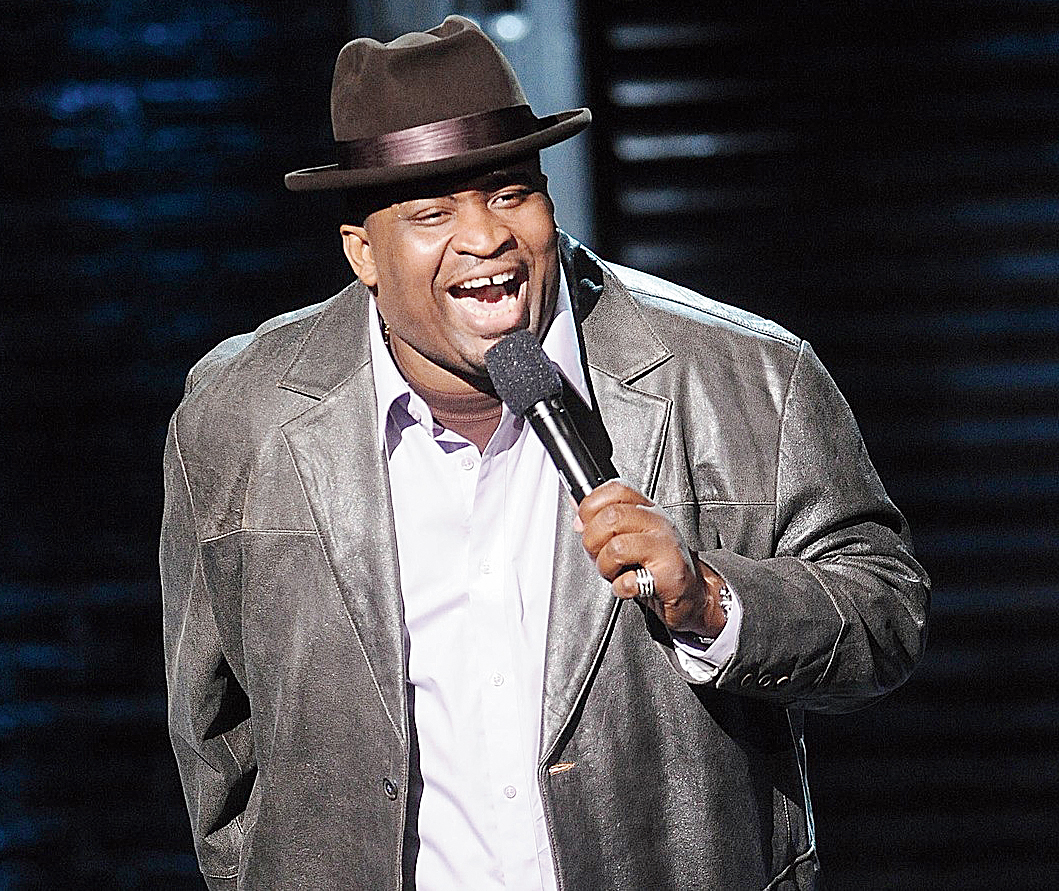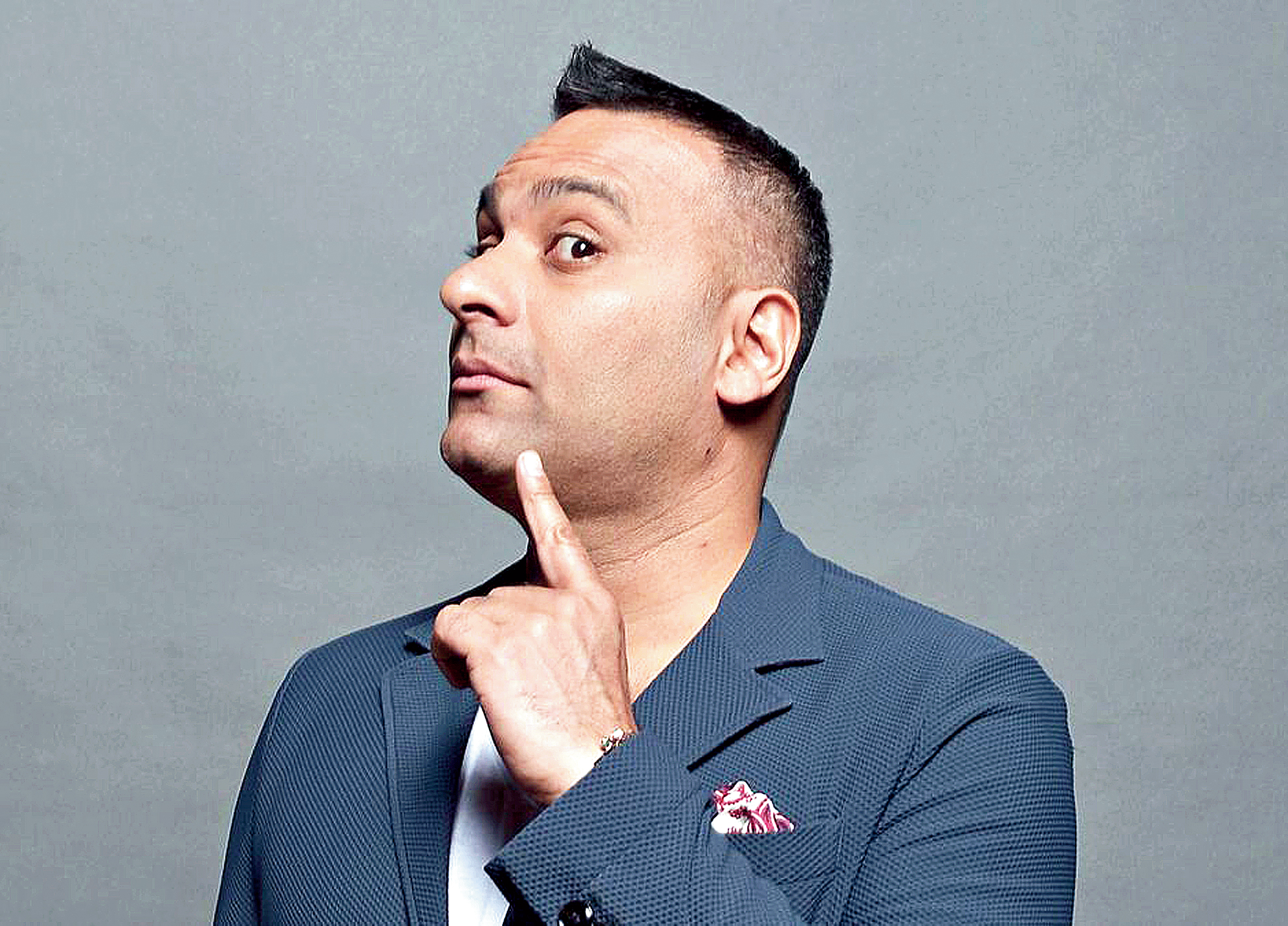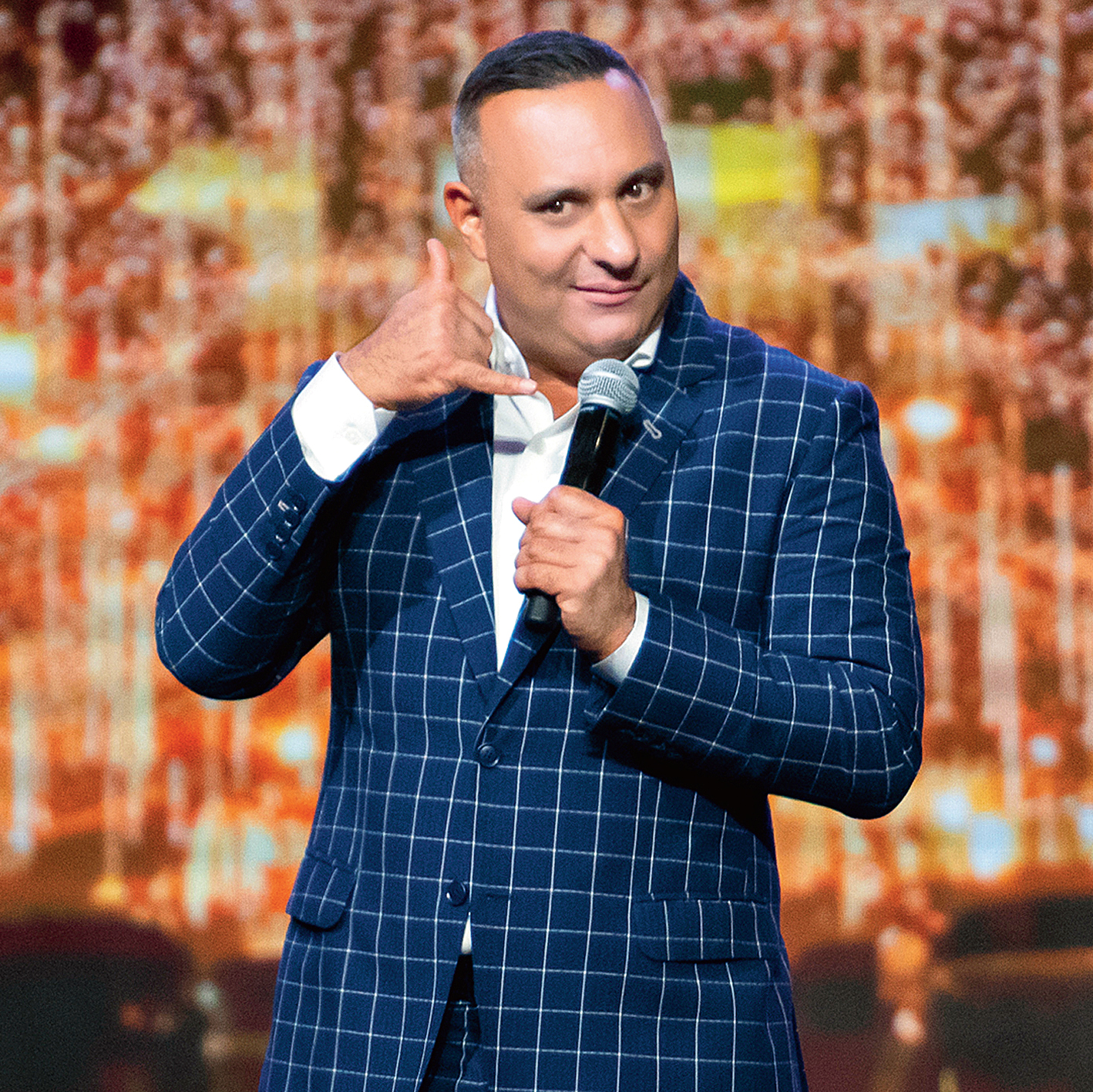Canada in the 1970s and ’80s, when Russell Peters was growing up in Brampton, a suburb of Toronto, wasn’t as welcoming to migrants as it is today. Racism was common. As a child, Russell was so bullied in his school and neighbourhood that he took up boxing to defend himself. While boxing continues to be a passion for the 49-year-old, it was his ability to defuse situations with comedy and to make people laugh that stood him in good stead and went on to make it his career.
In 1998, fresh out of high school, Russell did a bunch of odd jobs, including working in the kitchen of The Hilton. But nothing stuck. It was an evening at the local comedy club Yuk Yuks that finally steered him towards the arc lights. For the first five years of his career, he was constantly on the road, performing at all kinds of venues and gigs. In 2004, one of his TV acts landed up on YouTube and instantly went viral. Russell was finally on his way to comedy stardom.
His 30-year-long career is peppered with many wins. With Notorious in 2013, he was one of the first comedians to record a Netflix special, he has had sold-out concerts, from Madison Square Garden to London’s O2 Arena and the Sydney Opera House. He has been featured several times in Forbes magazine’s list of the world’s highest-paid comedians.
Russell has a new stand-up comedy special on Amazon Prime, titled Russell Peters: Deported. Filmed over two sold-out nights at the NSCI Stadium in Mumbai, the special features his no-holds-barred brand of comedy that skewers all cultures and ethnicities. t2oS sat down for a chat with the Indo-Canadian to talk about his early years, woke comedy and what he thinks of the Indian comedy scene.
This is your 30th year in the business….
Thank you for noticing!
If I asked you to pick one highlight of your career, what would it be?
I think the one highlight would be the first time I sold out the Air Center in Toronto, which is my hometown. In 2007, we sold it out two nights in a row and it was 16,000 people per night. When you grow up the way we grew up, feeling less than a human a lot of the time and not feeling like an equal citizen because that’s how it was in the ’70s and ’80s, it meant something to come back and have 32,000 people show up. The first night, before I went on stage, it didn’t really occur to me right away. But the minute the lights dimmed and I heard 16,000 people screaming, I knew that it was just for me. I started getting emotional, my chin started quivering, my eyes were filling up with tears and I had to go on and do comedy — it was all bad. (Laughs) But then, they gave me a standing ovation at the end and my chin started quivering all over again. If I’d started bawling in front of all those people, it might have been a sweet moment but would be one of those you regret later on in life.
What were your early days of comedy like, before that viral video Comedy Now?
When the viral video hit, I had already spent 15 years in the business — it was literally half my career. I didn’t expect anything more from my career, other than what I was already doing. I didn’t make a great living but enough to pay my mortgage every month. I just figured I liked doing comedy and I was having fun. That’s why everything after that is like gravy to me. I was already doing what I loved doing, and then to have it reach a level you never even knew existed, is all great in retrospective. Would I have changed anything? Not really.
In those first 15 years though, you were probably the only person on the comedy circuit (in Toronto). What was that like and how much has changed in the years since?
When I started in 1989, there was no one else. There were a couple of Indian guys and a Sri Lankan guy messing around with it in Toronto, but they just tried it and didn’t do it again. But I just wanted to do this, and my dad tried to talk me out of it at the time. Not for any other reason but that he didn’t want me to get my feelings hurt. He’d say this wasn’t the industry for us — it’s for the blacks, the whites. It’s their industry and where they dominate. We’re not in this game. And I told him that’s exactly why I was going to do this because we’re not in it. We were an invisible minority and I wanted to make us visible.
And you did. I imagine there’s a WhatsApp group with Mindy (Kaling), Hasan (Minhaj) and Lilly (Singh)…
(Laughs) There is one on Twitter, but it’s a little weird for me, it’s just not my thing. It’s all these highly educated, smart, American desis but they’re not street-smart. I’m a street smart guy. I see them talking and I’m like: “Shut up. Pompous, arrogant… I don’t wanna hear about it.” But that’s just me. I never hung around those kinds of people. My friends to this day aren’t that bright. I have a pretty dumb batch of friends.
Were your earlier sets similar to what you do now, in terms of talking about your Indian heritage?
Not really. When I started doing comedy, I obviously did Indian jokes and they were a little bit more silly at that time. I had no peers, so I was meandering my way through and trying to figure this thing out. Some jokes were really good, others were awful but the reason why this newer generation of comics gets to do a higher level of comedy is because I’ve done the crap for them already.
It’s a lot of trial and error and 30 years in, it still remains that way.

'What I have been doing lately is going on YouTube and listening to old Patrice O’Neal interviews and stuff like that. He was a good friend of mine, whose couch I used to sleep on 23 years ago. I always feel that he was the freest comic I ever met, in that he did not care whether you liked or hated him' (Picture sourced by The Telegraph)
What can we expect from the Deported special?
The special is on the Deported world tour, which I recorded here in Bombay. I’ve basically made a career out of making fun of Indian people, or taking the mick out of us. What people don’t understand when I talk about you, make jokes about you, is that it’s out of respect and love — that’s why I do it. If you look for my act and find out who I didn’t talk about, you’d think I don’t like those people very much. If I talk about you and make fun about you, it’s a sign that I’m aware of you and because we are the same, we can all enjoy this together. So shooting it in Bombay on my 30th anniversary was my way of paying it back to India. I know what I’ve done over the years but here’s my tribute to let you know that it was done out of love and respect. It’s a very important special for me.
You’ve spoken about how it’s one of your most personal sets.
talk about getting older and having health problems, struggling with weight and becoming a new father at 49. These are not fun things to happen.
When you put in that much of yourself to make fun of, are there apprehensions? Is there a part of your brain that says not to tell the world this?
No, my brain doesn’t work like that. If I think it, my brain says to do it. What’s the worst that could happen? We live in a time when you can literally find out what’s the worst that’s going to happen. We’re going to have a whole generation of people that are fake and afraid to have any initial thoughts and what they naturally think about. They’re afraid to question anything because they’re told to become robots.
They’re programming people into not thinking in a homogenised way, and that’s okay but you can’t get mad at people if they question it or want more information. For me to question things is my natural instinct. It shows that we’re trying to understand your point of view and maybe work with you on it.
You’ve performed in India many times. Is the audience different and do they see your material differently. Have you changed over the years?
I’ve always said this about India, and I’ll always say it. The Indian audiences get the jokes so much better than the rest of the world gets them. The Indians in India are so much sharper and more astute than the Indians that have left the country. Because for those who left, India stopped in the year they left. For those who left in 1970, India is still in 1970 in their heads and they can’t even fathom India being like this now, or people being this aware or politically minded and forward thinking. When I perform in America and there are Indian people in the audience, they all get more shocked by what I’m saying than the Indians in India will. Here, I would try saying little things to see how far I could go and they got every single reference, which was pretty cool. You’re not trying to be Indian here, you just are. Over there, they’re overcompensating.
A large part of your comedy comes from making fun of your Indianness...
It’s not so much making fun of the Indianness. It’s more about my Indian experience. It’s funny because every culture and race thinks their experience is unique to them, but it’s really not. A Turkish mom or an Armenian mom is similar to an Indian mom — we literally all do the exact same things but we’re so self-involved, we all think we’re the only ones doing them. So when I’m making jokes about Indians, I’m really making jokes about everybody.
But that’s also the criticism that comes your way, in terms of harping on stereotypes?
I don’t really do that much any more. You can only do that for so long — if you think you’re getting bored, even I’m getting bored of it. And I’m very self-aware. I won’t try and sell you the same car every time I come on stage. But it’s also a slow progression for everybody else too. Initially, people liked what you did, so they’re coming to see some form of that brand of comedy. If you look at my act from 2008 to 2018, you’ll see a progression where it gets less and less, until it just becomes about me. That’s where it’s at right now. When I started writing the new act in November, I had no clue in what direction I was going with it. I couldn’t continue to go down that personal route because it would have got boring. I had to figure it out again.
You mentioned the homogeneous programming of people, and that’s one of the things one’s noticing more and more on the comedy circuit. Comedians are talking about how cancel culture and PC (political correctness) culture are going to kill comedy.
Well they can try. The younger comics probably have it harder than the older guys like us because they’re coming up in that, while we came up before that. We’re not ready to bow and change for you — that’s your problem, don’t make it my problem. Just because I question or say certain things, there’s no more or less to it; it’s just what I said or did. Don’t read into it, because there’s nothing more there. That’s why I say when you want to hear the truth, talk to old people or children. My generation of comics would be the old people now, I’m going to be 50.

'I won’t try and sell you the same car every time I come on stage. Initially, people liked what you did, so they’re coming to see some form of that brand of comedy. If you look at my act from 2008 to 2018, you’ll see a progression where it gets less and less, until it just becomes about me. That’s where it’s at right now' (Picture sourced by The Telegraph)
Is there another comedian’s special you’ve seen recently that’s caught your attention?
I don’t really watch comedy. I don’t want to go and look at other people’s work. Chances are, no matter who the comic is, I’ve seen them working this material out in the clubs. It’s like I’ll drop into the comedy store and (Dave) Chappelle will be there and I don’t peek my head in. I’ll wait for him to be done, say “what’s up”. I’m a fan of comedy but I don’t need it that badly. What I have been doing lately, though, is going on YouTube and listening to old Patrice O’Neal interviews and stuff like that. He was a good friend of mine, whose couch I used to sleep on 23 years ago. I always feel that he was the freest comic I ever met, in that he did not care whether you liked or hated him. He said exactly what he wanted to say. Sadly he passed away, but I always wonder how he would be in this cancel culture. He would nail it right on the head as to what’s wrong with it. He was that astute when it came to articulating himself.
Pretty much everything in pop culture today has political overtones. And that’s something you’ve always shied away from.
I’ve never shied away from it. I don’t know enough, if anything, about politics or the political world. And I don’t care enough about it because I know nothing about it. So me talking about it would be someone talking to me about deejaying — I don’t want to hear about it. And it’s on TV every night, every channel has some monologue involving politics and if you see it for free on TV and it’s probably done better than I would be able to do it anyway, why would I want to tackle it too?
Is there a question you hate being asked?
Yes: “Who’s your favourite comic?” “Who are the people you look up to in comedy” is one of the worst questions. And “What can we expect from your show?” You know why? Because it’s a comedy show — what do you think you can expect?
How clued in are you into the Indian comedy scene?
Oh, I’m not clued in at all. Somebody told me I’ve spawned a lot of comedy babies. But if I’m not watching and I’m not going to watch, there’s people that may catch my attention but I’m not really watching a special. I watched part of Dave’s new special and what I saw was fantastic, but that’s about it.
